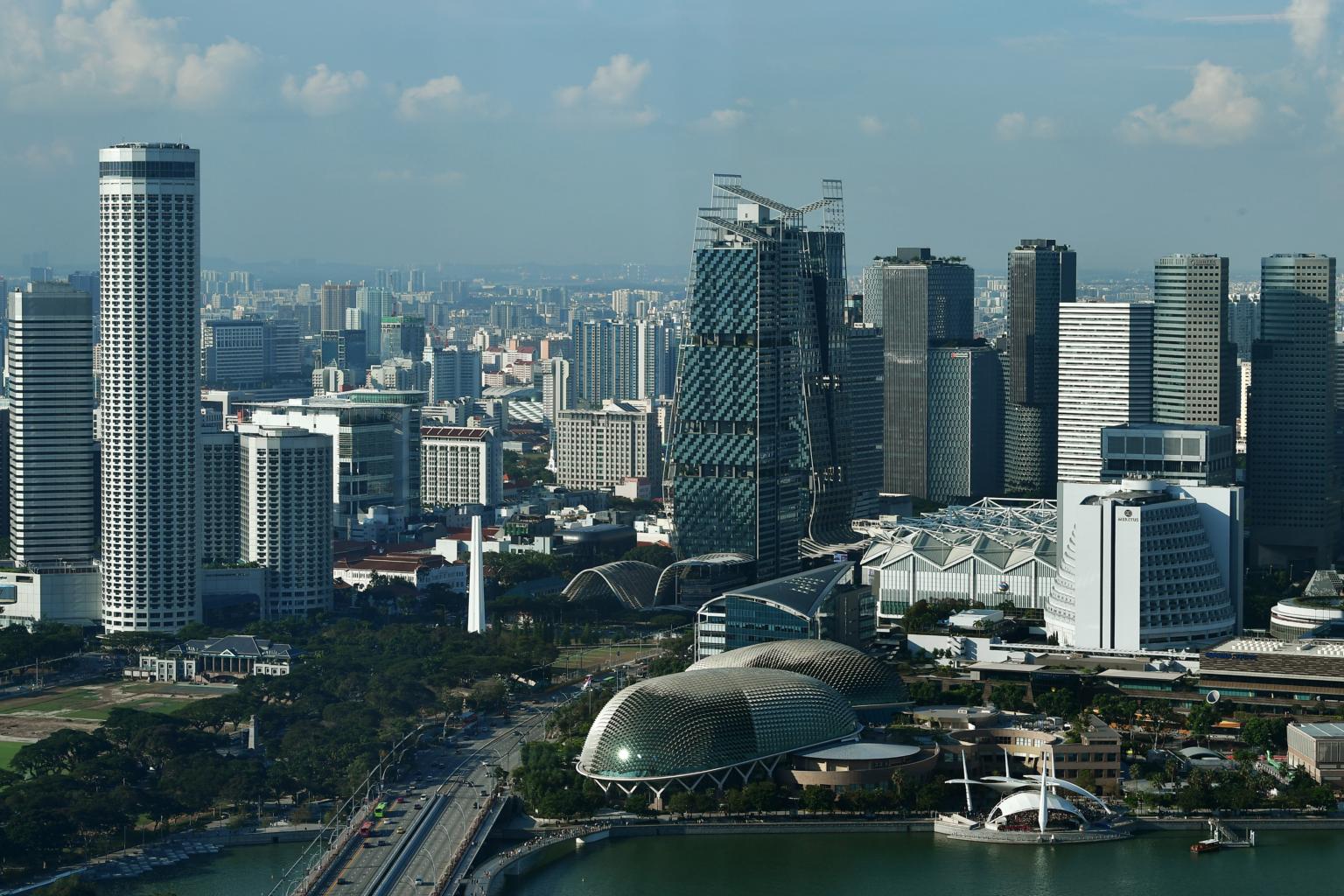IMF slashes Singapore growth forecasts to 0.5% in 2019 and 1% next year; big downgrade for Hong Kong
Sign up now: Get ST's newsletters delivered to your inbox

For 2020, IMF estimates Singapore's growth at 1 per cent, compared to its prediction of 2.4 per cent in April.
ST PHOTO: LIM YAOHUI
SINGAPORE - The International Monetary Fund (IMF) has slashed gross domestic product growth forecasts for Singapore as well as most other Asian economies for 2019 and 2020 relative to its estimates in April.
In its latest Regional Economic Outlook released on Wednesday (Oct 23), the IMF projects Singapore's growth for 2019 to be 0.5 per cent, sharply down from the 2.3 per cent it had forecast in its World Economic Outlook in April. The Singapore Government expects growth to come in between 0 and 1 per cent this year. Some private economists predict the number will be at the lower end of that range. Singapore's growth in 2018 was 3.1 per cent.
For 2020, the IMF estimates Singapore's growth at 1 per cent, compared to its prediction of 2.4 per cent in April.
It forecasts that China's growth will fall to 6.1 per cent this year and then further to 5.8 per cent in 2020, from 6.6 per cent in 2018. India is also projected to grow at 6.1 per cent in 2019, down from 6.8 per cent last year.
Among Asian economies, Hong Kong is expected to experience the sharpest slowdown, with GDP growth slowing to 0.3 per cent this year, compared to 3 per cent in 2018. In its April projections, which were made before the political turmoil in the territory intensified, the IMF had forecast that Hong Kong would grow at 2.7 per cent.
Taken together, Asian economies will grow at 5 per cent this year, according to the IMF, their slowest expansion since the global financial crisis of 2008. However, Asia will remain the world's fastest-growing region, contributing more than two-thirds to global growth.
Asia's economies are faced with "a likely prolonged period of heightened global policy uncertainty", according to the IMF. It notes that while the region's strong trade and financial integration is a sign of its economic success, it can also be a source of vulnerability.
One major risk is a possible escalation of the United States-China trade dispute. The fund's baseline forecasts assumed the continuation of all US tariffs imposed or announced before October. However, the US and China struck a mini-trade deal in early October under which the US agreed to hold off on increasing tariffs on US$250 billion (S$340 billion) of Chinese goods from 25 to 30 per cent, which were scheduled to take effect from Oct 15. China also agreed to step up its purchases of US farm goods.
While acknowledging the possibility of such upside surprises, the IMF points out that the path to durable trade agreements "remains subject to protracted and difficult negotiations", adding that new setbacks could weigh on confidence, weakening trade, investment and growth. For Asia, they could trigger shifts in supply chains out of China.
This process has begun, with more than 50 companies having already announced plans to move production out of China to avoid the risk of tariffs, including major manufacturers such as Apple, Samsung, HP, Dell and Nintendo. Most are considering relocating operations to South-east Asia and Mexico in particular.
Among other risks, the IMF flags the possibility of tighter financial conditions in Asia as a result of abrupt changes in investors' risk appetite, arising from either new trade restrictions or a reassessment of valuations. Capital outflows, coupled with a rise of the US dollar and higher costs of dollar financing could lead to slower growth in the region.
A faster-than-expected slowdown in China could add to the problem, given the close trade links between Asian economies and China as well as the integration of these economies in global value chains. A more volatile Chinese currency could also lead to financial spillovers according to the IMF.
Other risks for Asian economies include higher oil prices arising from supply-side shocks, such as the drone attack on a Saudi oil refinery last month; an escalation of the trade dispute between Japan and South Korea, which would affect technology supply chains; and socio-political risks in territories such as Hong Kong and Kashmir, which could also have potential economic repercussions.
To cushion the economic slowdown, the IMF recommends that Asian economies pursue accommodative monetary policies - which most are already doing. India should revive the flow of bank credit through faster cleanup of bank and corporate balance sheets. The fund also calls for expansionary fiscal policies in countries which have fiscal space, such as China, South Korea and Thailand.
For the medium term, the IMF proposes that Asian countries should lay the groundwork for strong, sustainable, and inclusive growth through further trade integration, including in services. They should also reform their product markets - for example, through pro-competition policies - as well as labour markets, by upgrading skills, taking measures to increase labour supply in countries where there are shortages, improving access to education and promoting the participation of women and the elderly in workforce.
Such measures "would not only help offset the demand shock from slower global trade but also facilitate adjustment to realigning global supply chains", says the fund.



